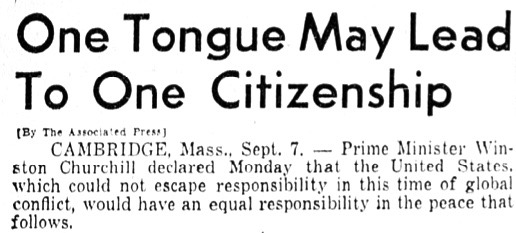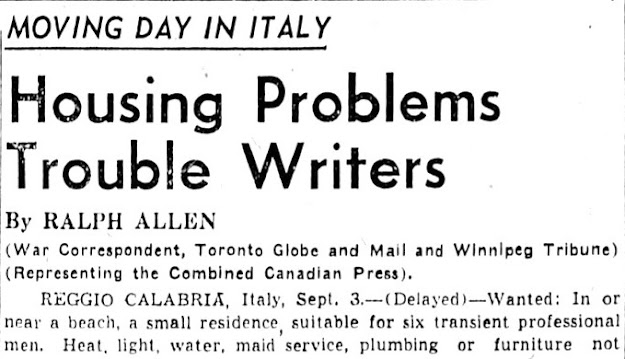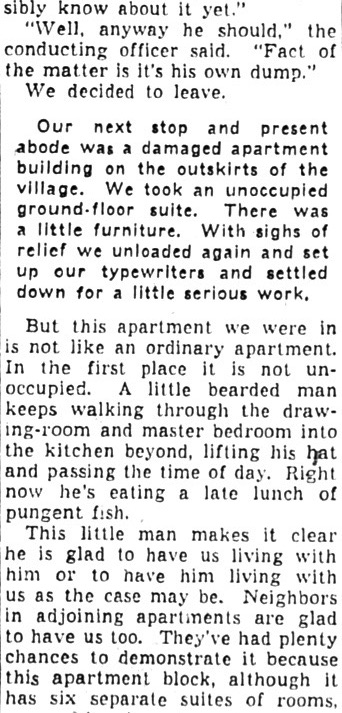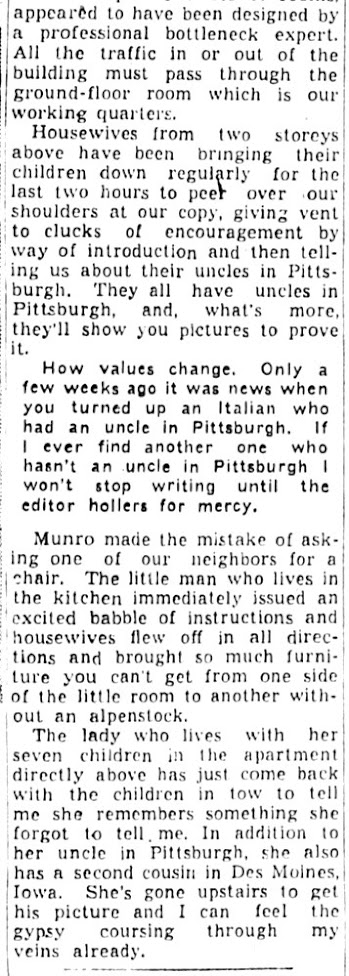The Invasion of the Toe of Italy's Boot, Beginning Sept.3, 1943
Articles, Context from The Winnipeg Tribune, Sept. 7, '43
Featuring PM Churchill's Full Report, and Housing Issues
Introduction:
Montgomery's Eighth Army and the Canadian First Division make gains on both sides of Reggio and Italy's toe, and they will soon be joined by Allied invaders at Taranto (the heel of the boot) and Salerno (the shin). Future articles from The Winnipeg Tribune will follow and tell the tale.
Meanwhile, Canadians in Combined Ops ferry men of war and all necessary supplies back and forth from Messina, and other Sicilian ports, to Reggio, and other Italian ports. Members of the Canadian 80th Flotilla of Landing Crafts will be active for about 30 days in the region, mainly on the Messina to Reggio 'tram line', but some will be asked to participate in the Salerno landings, i.e., Operation Avalanche, beginning on September 9, two days hence. Action will be very hot at Salerno, the toughest test yet since Operation Husky (invasion of Sicily), when the Luftwaffe bombarded the ferrying of troops and supplies every two hours for three straight days, beginning July 10, between Syracuse and Noto.
The following headlines, articles and tidbits (that provide some context for the times) are from The Winnipeg Tribune (issued Sept. 7, 1943), unless otherwise stated:
Monty landed at Reggio, above, then hung a left, and a right. Destination - Palmi,
Melito and beyond. Photo - As found in ECLIPSE by Alan Moorehead
PM W.C. Churchill receives an honorary degree at Harvard and presents a very lengthy, very lengthy, very, very lengthy report:
The above article continued to "boil and bubble" on page 2 of The Winnipeg Tribune, as did a very lengthy discussion by the PM under the following headline:
And the report that follows can be found here - The Winnipeg Tribune, Sept. 7, 1943
Because the report fills almost an entire newspaper page I recommend you clear your morning calendar and grab a coffee first...
Dover might be experiencing "invasion weather" but plans are definitely not in "the offing" re between the U.K. and France. Re Taranto and Salerno, Italy... now that's another matter. Stay tuned.
The front page on September 7 was home to the following three short bursts from Canadian war correspondents, and we'll hear more from Mr. Allen shortly re his housing issues:
The map's legend below indicates lines of communication are being bombed strategically, on both sides of the toe to assist with Allied forward progress; and between Naples and Salerno (among other places) to assist with landings two days hence.
As well, the caption suggests some steady progress all the way to the Po Valley is hoped for. But, as we know, we don't always get what we want. The Allies would not even enter Rome in force until early June, 1944.
Many members of the RCAF likely returned home with vivid memories of air attack on various fronts. According to reports I've read or heard (on old news reel or current documentaries), the chance of being injured or killed was much higher for pilots than for those who manned landing crafts, so when I read of an individual's significant memory of a spectacular scene I like to share it... and hope they came home safely. Another pilot's report of an extraordinary sighting will be shared in a future post re the invasion of Salerno, so please stay tuned:
Please click here to view a 1940s British Movietone newsreel entitled "Blasting the Reich: Mannheim (and Ludwigshafen) Raid".
Meanwhile, while great bombing attacks were making the news, Grape-Nuts Flakes were catching the eye of hard-working men everywhere!
Canadian war correspondents and men with other assorted duties, represented below by the aforementioned Ralph Allen, Ross Munro and a few of their roomies, had things in common with the Canadians in Combined Operations - who occasionally transported them here and there and who were the subjects of one or two of news stories about the invasion of mainland Italy (e.g., see previous post).
For example, the different groups of men had to make do with what they could find at times, re food and accommodation and other necessities, like smokes and vino and music, etc. Who had it the roughest? I leave it to you...
To help compare tales, I share the following from the memoirs of Lloyd Evans (RCNVR, Combined Operations), mentioned in the previous post, i.e., the Sept. 6 , 1943 issue of The Winnipeg Tribune by Richard (Dick) Sanburn:
Evans writes first about his time in Sicily during Operation Husky:
My Navy Chronicles, page 29
Mr. Evans writes no details concerning his accommodation while in Messina during Operation Baytown, because during landings farther up the coast from Reggio (during the first week of landings, beginning Sept. 3) he was injured by a spinning winch handle after a few passing Allied warships washed his landing craft off the beach.
(More details about L. Evan's adventure in The Med can be found at Combined Operations Command by Geoff Slee, Scotland).
That being said, my father lived in the same cave as Mr. Evans and describes "the high life" there - with a few of the same memories, as well as a few different ones too - and then adds details about accommodations in Messina during Operation Baytown. (Their memoirs provide so many similar accounts I initially thought they must have been very good mates; though they appear together in one photo provided me by Lloyd's son, Lloyd himself assured me that "he recognized my father but did not know him.")
Canadians in Comb. Ops circa 1942-43, on landing craft hanging from davits.
Back, L - R: unknown, P. Bowers, Lloyd Evans, Don Westbrook
Front, L - R: Don Linder, unknown, A/S Doug Harrison
Photo Credit - From the collection of Lloyd Evans
D. Harrison (Doug, Dad) writes in memoirs:
I had 27 days at Sicily living on tomatoes and Bully Beef. I swore I would kick the first bull I saw in Canada - right in the posterior - if I got back. Everywhere I looked there were anti-personal hand-sized grenades that needed only to be touched to go off. They were built to maim and not kill because it takes men to look after the wounded, but if you’re dead, you’re dead. We threw tomatoes at a lot and exploded them in that manner....
Just another little sidelight*. We had acquired a portable record player in a green round box with an ample supply of records by Artie Shaw, Glen Miller, Vaughn Munroe and Tommy Dorsey. We had to wind it by crank and we cranked it so much we broke the handle. Then we had to spin the record with our index finger. It was quite a chore to get the correct speed but with time we achieved it. How I wish I had that record player and records today.
*Harrison also recalls, as Evans did, wet bedding in Sicily, and having to take it outside in the morning and toss it over bushes to dry it out during the day.
Harrison's memoirs move on to his recollections re the invasion of Italy in September, 1943 and he mentions a few words about "casas and houses":
After a time we were sleeping in casas or houses and I had a helper, a little Sicilian boy named Pietro. First of all I scrubbed him, gave him toothpaste, soap and food. He was cute, about 13 or 14 years of age, but very small because of malnutrition. His mother did my washing and mending for a can of peas or whatever I could scrounge. I was all set up.
When Italy caved in there was a big celebration on the beach, but I had changed my abode and was sleeping with my hammock, covered with mosquito netting, slung between two orange trees. I didn’t join in the celebration because I’d had enough vino, and you not only fought Germans and Italians under its influence, you fought your best friend.
"Dad, Well Done", page 33 - 35
"Dad, Well Done", page 33 - 35
Later in life my father contributed stories about his WWII experiences to books self-published by Navy veterans and to his hometown paper, the Norwich Gazette (available at Norwich Museum and Archives). In a Gazette article (published in the early 1990s) he expanded on his memories about his accommodations and routine while in Messina (and transporting supplies to Reggio) during Operation Baytown:
Our living quarters was a huge Sicilian home (in Messina) and some nights I slept on my hammock on a beautifully patterned marble floor. However, since that was a hard bunk I sometimes slung my hammock, covered with mosquito netting, between two orange trees in the immense yard. Canned food was quite plentiful now and several young Sicilian boys, quite under-nourished, came begging for handouts, especially chocolota, as they called our chocolate bars.
I took a boy about 11 years old under my wing when off duty. In one corner of the yard was a low, square, cement-walled affair complete with a cement floor, tap and drain hole. It was here I introduced “Peepo” to Ivory soap, Colgate toothpaste and hair tonic for his short, shiny, ringletted black hair. My name was “Do-go” which I am still called today at navy reunions, and this boy really shone when I had finished his toilet. Peepo wasn’t too keen on soap and water and it certainly was obvious, but not for long.
I tried to learn some of his language, and he mine (the Canadian Marina). Although we were from countries thousands of miles apart, the war had brought us together and we got along famously.
Our living quarters was a huge Sicilian home (in Messina) and some nights I slept on my hammock on a beautifully patterned marble floor. However, since that was a hard bunk I sometimes slung my hammock, covered with mosquito netting, between two orange trees in the immense yard. Canned food was quite plentiful now and several young Sicilian boys, quite under-nourished, came begging for handouts, especially chocolota, as they called our chocolate bars.
I took a boy about 11 years old under my wing when off duty. In one corner of the yard was a low, square, cement-walled affair complete with a cement floor, tap and drain hole. It was here I introduced “Peepo” to Ivory soap, Colgate toothpaste and hair tonic for his short, shiny, ringletted black hair. My name was “Do-go” which I am still called today at navy reunions, and this boy really shone when I had finished his toilet. Peepo wasn’t too keen on soap and water and it certainly was obvious, but not for long.
I tried to learn some of his language, and he mine (the Canadian Marina). Although we were from countries thousands of miles apart, the war had brought us together and we got along famously.
He and I also wandered about Messina. I went with Peepo to meet his Mamma. I took some canned food, chocolota and compost tea, a complete tea in a can exactly like a sardine can, with a key attached as well. Although the lad’s mother was forty-ish, she appeared older. Over a cup of tea, and with difficulty, Mrs. Guiseppe said she would do some laundry for me, and mending.
In order to heat water and cook a bit, our fellows cut large metal hardtack biscuit tins in half, filled them with sand, poured on gasoline and cooked to their heart’s content. The hardtack biscuits are a story in themselves, hard as a rock even after soaking in compost tea. I think some tins were marked 1917.
Some of the Sicilian homes were but hovels, with dirt floors, complete with goats, donkeys, and chickens in the kitchen. The population drank wine at meals as we would tea. I saw wagons being pulled by oxen. Wine (vino) in wooden barrels was everywhere and our flotilla tapped the odd barrel.
In the navy we just acquired things. A tent was set up on the beach after we acquired some salves, soap and gauze to treat the locals who had rashes and cuts, etc. The word spread about the Canadian Marina Hospital and one morning a few days after we opened, two very pregnant ladies appeared. The work of mercy ended, and very quickly I might add, amidst our embarrassment.
Some buddies and I spent my 23rd birthday (Sept. 6) singing our lungs out in a cottage-style house near the beach, complete with a piano but incomplete with no roof. I had my guitar along and we all had some vino. About midnight with the hilarity in full swing, thunder rolled, the skies opened and the first rain in months came pouring in. Soaked inside and out we headed to where we belonged, singing “Show Me the Way to Go Home” as big as life and twice as natural.
One night shortly after that event I was all snug in my hammock, mosquito netting all tucked in (it took a while). I was ready to drop off to sleep when all hell broke loose on the beach.
In order to heat water and cook a bit, our fellows cut large metal hardtack biscuit tins in half, filled them with sand, poured on gasoline and cooked to their heart’s content. The hardtack biscuits are a story in themselves, hard as a rock even after soaking in compost tea. I think some tins were marked 1917.
Some of the Sicilian homes were but hovels, with dirt floors, complete with goats, donkeys, and chickens in the kitchen. The population drank wine at meals as we would tea. I saw wagons being pulled by oxen. Wine (vino) in wooden barrels was everywhere and our flotilla tapped the odd barrel.
In the navy we just acquired things. A tent was set up on the beach after we acquired some salves, soap and gauze to treat the locals who had rashes and cuts, etc. The word spread about the Canadian Marina Hospital and one morning a few days after we opened, two very pregnant ladies appeared. The work of mercy ended, and very quickly I might add, amidst our embarrassment.
Some buddies and I spent my 23rd birthday (Sept. 6) singing our lungs out in a cottage-style house near the beach, complete with a piano but incomplete with no roof. I had my guitar along and we all had some vino. About midnight with the hilarity in full swing, thunder rolled, the skies opened and the first rain in months came pouring in. Soaked inside and out we headed to where we belonged, singing “Show Me the Way to Go Home” as big as life and twice as natural.
One night shortly after that event I was all snug in my hammock, mosquito netting all tucked in (it took a while). I was ready to drop off to sleep when all hell broke loose on the beach.
Machine gun fire, tracer bullets drawing colourful arcs in the dark sky. Someone shook my hammock and asked if I was coming to the beach party - Italy had thrown in the sponge.
I said, “No, I’m not coming, and would you please keep it down to a dull roar because I want to log some sleep.”
After about a month Do-go had a tearful goodbye with his friend Peepo. He stood on the beach and I on my landing craft, waving our goodbyes. What a strange war. I have thought of him often.
After about a month Do-go had a tearful goodbye with his friend Peepo. He stood on the beach and I on my landing craft, waving our goodbyes. What a strange war. I have thought of him often.
"Dad, Well Done", pages 115 - 117
All in all, I think my father had a better time of it in some situations, the war correspondents had it better in others. I say, re accommodations, etc., it's a draw.
All in all, I think my father had a better time of it in some situations, the war correspondents had it better in others. I say, re accommodations, etc., it's a draw.
Now, back to The Winnipeg Tribune:
The "Happy Days" are just about over for the German U-Boats:
Another column (delayed) by Mr. Allen, written before he got all settled into a busy apartment building with a half-dozen Italian families popping by every few minutes : )
The "Italy Peace Bid" is just around the corner:


Russians were not the only ones to face a tough Nazi Defense System. As many have said before me, "Italy was a tough slog."
The U-Boat war was another tough slog as well:
Stalin was hard to please...
More will soon follow from The Winnipeg Tribune to highlight progress during Operation Baytown.
Please link to Editor's Research: Operation Baytown (Italy WWII) (6)
Unattributed Photos GH












































No comments:
Post a Comment